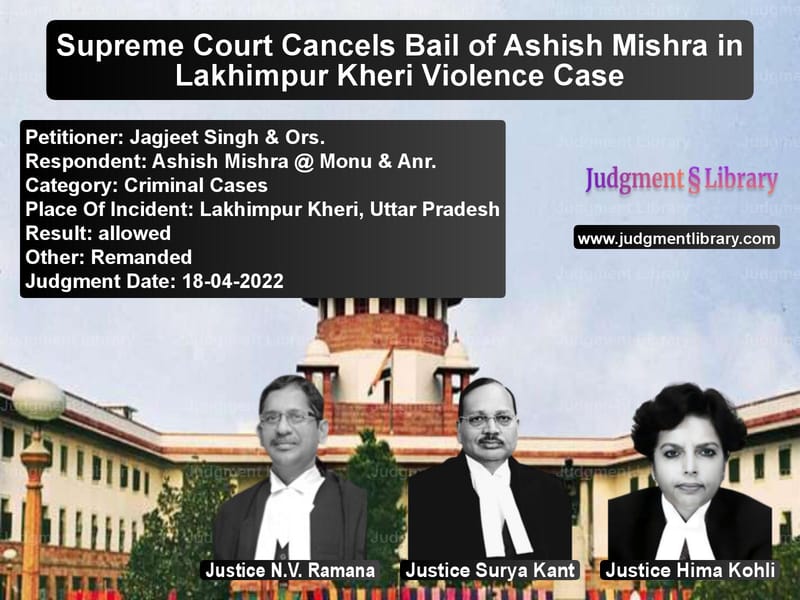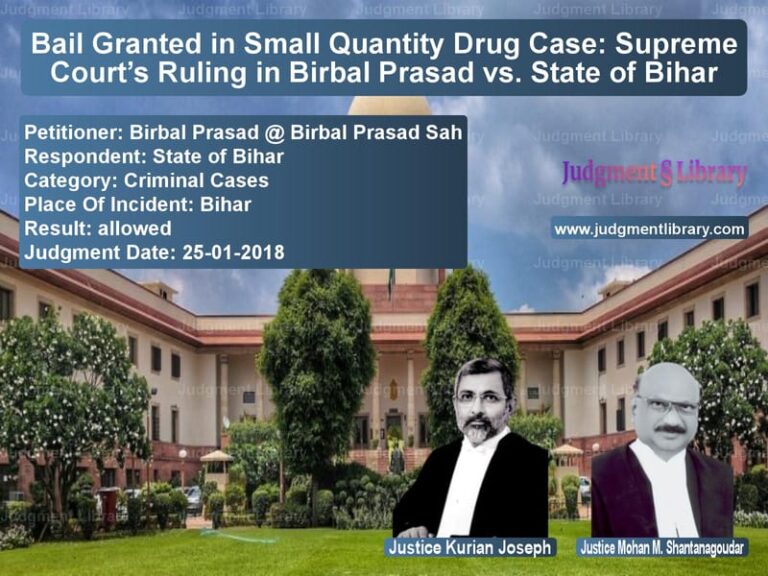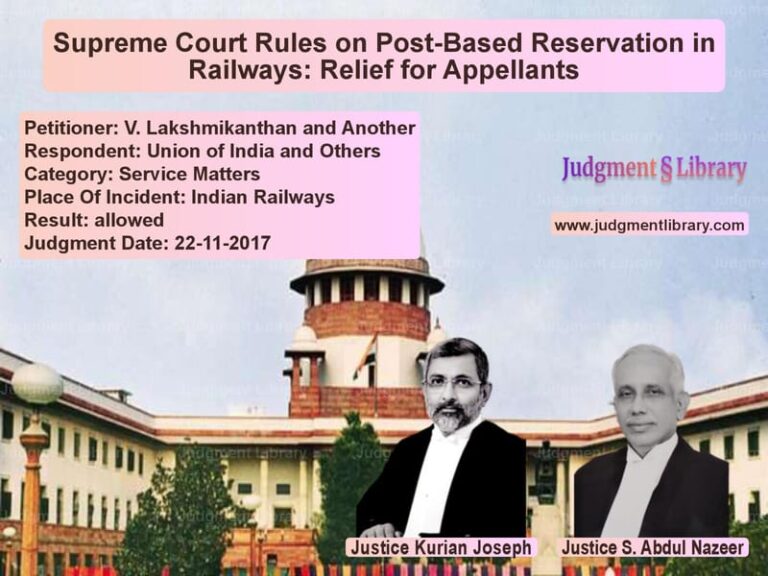Supreme Court Cancels Bail of Ashish Mishra in Lakhimpur Kheri Violence Case
The Supreme Court of India recently delivered a significant ruling in the case of Jagjeet Singh & Ors. vs. Ashish Mishra @ Monu & Anr., overturning the bail granted to Ashish Mishra, the prime accused in the Lakhimpur Kheri violence case. The case was closely watched as it raised crucial legal questions regarding bail jurisprudence, victims’ rights in bail hearings, and the role of courts in ensuring fair justice.
Background of the Case
The case pertains to the violent incident that occurred on October 3, 2021, in Lakhimpur Kheri, Uttar Pradesh, where four farmers and a journalist were allegedly killed after being run over by a convoy of vehicles. These vehicles were reportedly linked to Ashish Mishra, the son of Union Minister of State for Home Affairs, Ajay Mishra.
The incident took place during a protest organized by farmers against the three farm laws that were later repealed by the government. According to eyewitness accounts and video evidence, a Mahindra Thar SUV, allegedly driven by Ashish Mishra or his associates, plowed into a group of farmers, leading to multiple fatalities. Following the incident, violence erupted, resulting in the deaths of three others, including BJP workers.
After intense pressure from the victims’ families and public outrage, an FIR was registered against Ashish Mishra under multiple sections of the Indian Penal Code (IPC), including:
- Section 302 – Murder
- Section 307 – Attempt to Murder
- Section 326 – Voluntarily Causing Grievous Hurt
- Section 120B – Criminal Conspiracy
A Special Investigation Team (SIT) was formed to probe the incident, and Ashish Mishra was arrested on October 9, 2021. However, in February 2022, the Allahabad High Court granted him bail, leading to a challenge before the Supreme Court.
Legal Issues
- Whether the Allahabad High Court erred in granting bail without considering the gravity of the offense.
- Whether victims have the right to be heard at the bail stage.
- Whether the accused’s bail posed a threat to witnesses and obstructed justice.
- The broader implications of the ruling on future high-profile bail applications.
Arguments by the Parties
Petitioners’ Arguments
- The victims’ families, represented by their counsel, argued that the High Court failed to apply proper legal principles while granting bail.
- They contended that Ashish Mishra’s release posed a serious threat to witnesses, with reports suggesting that key witnesses had been intimidated after his release.
- The petitioners emphasized that the crime was not an ordinary accident but a deliberate act of violence, making it imperative for the accused to remain in custody.
- They relied on past Supreme Court precedents, stating that bail should not be granted if it undermines public confidence in the justice system.
Respondent’s Arguments
- Ashish Mishra’s defense team argued that there was no direct evidence linking him to the crime scene.
- They contended that he was attending a wrestling event (Dangal) at the time of the incident, providing an alibi.
- They maintained that the allegations were politically motivated and part of a conspiracy to tarnish his reputation.
- The defense also argued that bail should be granted as a matter of right unless there was clear evidence of obstruction of justice.
Supreme Court’s Judgment
Key Observations
- The Supreme Court ruled that victims have the right to be heard during bail proceedings, reinforcing the principle that justice should be inclusive.
- The Court found that the High Court’s decision was based on an incomplete assessment of the evidence, which failed to consider crucial witness statements and forensic reports.
- It noted that witness intimidation had already occurred after Ashish Mishra’s release, strengthening the argument that his bail posed a threat to the fair trial process.
- The Court emphasized that bail decisions must be made by balancing individual liberty with public interest and should not be granted mechanically in serious offenses like murder.
Final Decision
The Supreme Court canceled Ashish Mishra’s bail and directed him to surrender immediately:
“The victims’ right to be heard is paramount, and a bail order ignoring relevant evidence cannot stand.”
Implications of the Judgment
For Bail Proceedings
- The ruling reinforces that courts must exercise due diligence before granting bail in serious criminal cases.
- It establishes that victims and their families have a legitimate right to participate in bail hearings.
- The judgment serves as a deterrent against granting bail on superficial grounds.
For Witness Protection
- The ruling highlights the necessity for strong witness protection mechanisms in high-profile cases.
- It ensures that accused persons do not misuse bail to intimidate or influence witnesses.
- It underscores the responsibility of courts to consider witness safety while deciding bail applications.
For Future Criminal Cases
- The ruling sets a benchmark for handling bail applications in cases involving political influence.
- It ensures that the judicial system prioritizes fairness and public confidence over procedural formalities.
- The decision strengthens the role of the Supreme Court in safeguarding the rule of law.
Conclusion
The Supreme Court’s decision in Jagjeet Singh & Ors. vs. Ashish Mishra @ Monu & Anr. marks a crucial moment in India’s legal landscape. By canceling the bail granted to a high-profile accused, the Court reaffirmed its commitment to ensuring justice is not only done but is also seen to be done. The judgment reinforces the importance of witness protection, the rights of victims in bail hearings, and the need for courts to adopt a cautious approach in serious criminal cases. This ruling is expected to have long-lasting implications for future bail jurisprudence in India.
Petitioner Name: Jagjeet Singh & Ors..Respondent Name: Ashish Mishra @ Monu & Anr..Judgment By: Justice N.V. Ramana, Justice Surya Kant, Justice Hima Kohli.Place Of Incident: Lakhimpur Kheri, Uttar Pradesh.Judgment Date: 18-04-2022.
Don’t miss out on the full details! Download the complete judgment in PDF format below and gain valuable insights instantly!
Download Judgment: jagjeet-singh-&-ors.-vs-ashish-mishra-@-monu-supreme-court-of-india-judgment-dated-18-04-2022.pdf
Directly Download Judgment: Directly download this Judgment
See all petitions in Bail and Anticipatory Bail
See all petitions in Custodial Deaths and Police Misconduct
See all petitions in SC/ST Act Case
See all petitions in Judgment by N.V. Ramana
See all petitions in Judgment by Surya Kant
See all petitions in Judgment by Hima Kohli
See all petitions in allowed
See all petitions in Remanded
See all petitions in supreme court of India judgments April 2022
See all petitions in 2022 judgments
See all posts in Criminal Cases Category
See all allowed petitions in Criminal Cases Category
See all Dismissed petitions in Criminal Cases Category
See all partially allowed petitions in Criminal Cases Category







